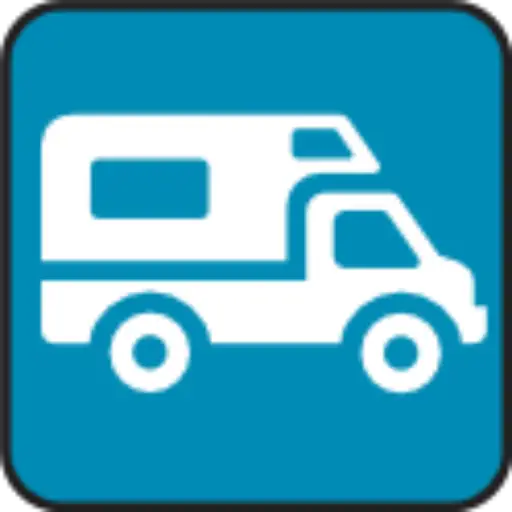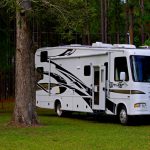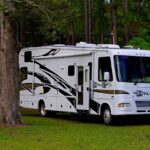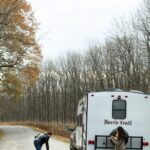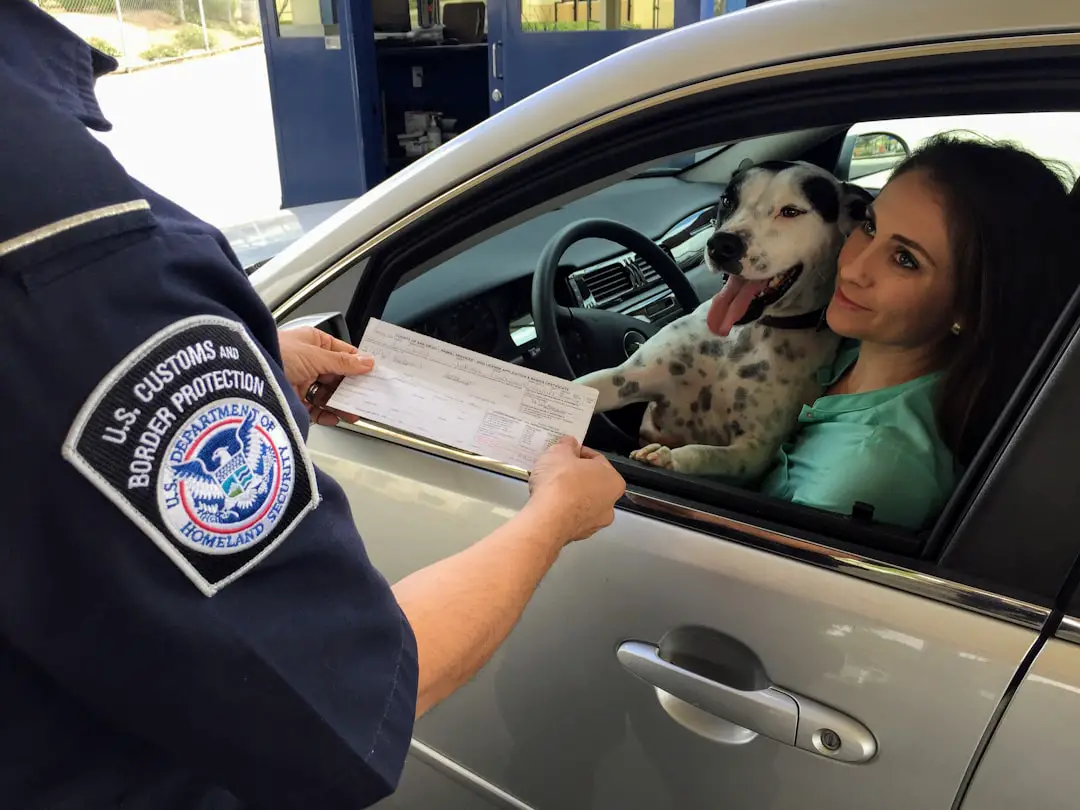
Imagine waking up to breathtaking mountain views, exploring hidden gems in charming small towns, and living life on your own terms. Full-time RV living offers a unique blend of freedom, adventure, and simplicity. But before you pack your bags and hit the open road, it’s crucial to understand the financial realities of this nomadic lifestyle. We’ve been there, and we’re here to help you navigate the twists and turns of budgeting for full-time RV living.
This comprehensive guide will break down the essential expenses, provide tips for reducing costs, and reveal the secrets to a financially sound RV adventure. We’ll explore everything from campground fees and fuel costs to utilities and entertainment. We’ll also share real-world insights from experienced RVers and offer practical advice for making your dream a reality.
Key Takeaways
- Full-time RV living costs can range from $1,500 to $5,000+ per month, depending on your travel style, RV type, and personal spending habits.
- Housing is the biggest expense, followed by fuel, food, and utilities.
- There are many ways to reduce your RV living costs, including boondocking, joining discount clubs, and traveling during the off-season.
- A well-planned budget and a commitment to minimalism are essential for successful full-time RV living.
👉 Shop Solar Generators:
- Jackery Solar Generator 3000 Pro: RVShare | Outdoorsy | Jackery Official Website
- Jackery Solar Generator 2000 Plus: RVShare | Outdoorsy | Jackery Official Website
Table of Contents
- Quick Tips and Facts
- The Evolution of Full-Time RV Living
- Full-Time RV Living: A Lifestyle Choice
- Factors Influencing Your Monthly RV Budget
- Breaking Down the Costs: Essential Expenses
- Housing: The Biggest Chunk of Your RV Budget
- Fuel: The Road Less Traveled
- Food: Eating Well on the Road
- Utilities: Keeping the Lights On
- Maintenance: Keeping Your RV in Tip-Top Shape
- Insurance: Protecting Your Investment
- Healthcare: Staying Healthy on the Road
- Entertainment: Finding Fun on the Road
- RV Living Cost Calculator: Budgeting for Your Adventure
- Tips for Reducing Your RV Living Costs
- Conclusion
- Recommended Links
- FAQ
- Reference Links
Quick Tips and Facts
- 🤔 Thinking about full-time RV living? It’s more affordable than you might think! See our related article about 19 Dangers Of Living In An RV: The Ultimate Guide To RV Safety 🚐 here.
- 💰 Monthly costs can range from $1,500 to $5,000+, depending on your travel style and spending habits.
- ⛽ Fuel is one of the biggest expenses, so plan your routes carefully and consider fuel efficiency.
- 🏕️ Campground fees can add up quickly, but there are ways to save, like boondocking or joining discount clubs.
- 🔌 Solar panels can significantly reduce your electricity costs and give you more freedom to roam off-grid.
The Evolution of Full-Time RV Living
The dream of hitting the open road and living life on your own terms is nothing new. But over the years, full-time RV living has evolved from a niche lifestyle to a mainstream movement.
- Early Days: What began as a way for traveling salesmen and seasonal workers to have a place to call home while on the road has transformed into a lifestyle embraced by families, young adventurers, and retirees alike.
- The Rise of Remote Work: The digital nomad movement has been a game-changer, allowing people to work from anywhere with an internet connection. This has opened up a world of possibilities for RVers, who can now earn a living while exploring the country.
- The Impact of Social Media: Platforms like Instagram and YouTube have given rise to a vibrant community of RVers who share their experiences, tips, and stunning photos. This has made the lifestyle more accessible and appealing than ever before.
Full-Time RV Living: A Lifestyle Choice
Full-time RV living is more than just a way to travel; it’s a complete lifestyle shift. It’s about embracing minimalism, prioritizing experiences over possessions, and connecting with nature.
- Freedom and Flexibility: Imagine waking up to a new view every morning and having the freedom to go wherever you want, whenever you want. That’s the beauty of RV life!
- Simplified Living: Downsizing to an RV forces you to re-evaluate your priorities and let go of material possessions. It’s about living with less and appreciating the things that truly matter.
- Adventure Awaits: From national parks to charming small towns, there’s always something new to discover on the open road. RV living is all about embracing adventure and creating unforgettable memories.
Factors Influencing Your Monthly RV Budget
No two RVers are alike, and your monthly expenses will vary depending on a number of factors:
- RV Type: A smaller Class B van will generally be cheaper to operate than a larger Class A motorhome.
- Travel Style: Do you prefer staying in upscale RV resorts or boondocking in the wilderness? Your accommodation choices will significantly impact your budget.
- Eating Habits: Eating out for every meal will quickly drain your funds. Cooking most of your meals in your RV kitchen will save you a lot of money.
- Entertainment Choices: Are you a homebody who enjoys quiet evenings at the campground, or do you crave adrenaline-pumping activities? Your entertainment preferences will play a role in your spending.
- Location, Location, Location: Traveling in high-cost areas like California or the Northeast will inevitably be more expensive than exploring more affordable regions.
Breaking Down the Costs: Essential Expenses
To give you a clearer picture of what to expect, let’s break down the typical monthly expenses for full-time RVers:
| Expense | Description |
|---|---|
| Housing | Campground fees, RV park rentals, or boondocking costs. |
| Transportation | Fuel costs fluctuate depending on gas prices and RV size. |
| Food | Groceries and occasional dining out. |
| Utilities | Electricity, water, sewer, and propane. |
| Maintenance | Regular upkeep and unexpected repairs. |
| Insurance | Specialized RV insurance to protect your investment. |
| Healthcare | Health insurance is essential for full-time travelers. |
| Communication | Reliable cell phone plan and internet access. |
| Entertainment | National park fees, dining out, and souvenirs. |
Housing: The Biggest Chunk of Your RV Budget
Your choice of accommodation will significantly impact your monthly RV living costs:
1. RV Parks
- Pros: Convenient hookups (electricity, water, sewer), amenities like pools and laundry facilities, often located near attractions.
- Cons: Can be expensive, especially in popular destinations, sometimes crowded and lacking privacy.
- Cost: $40-$100+ per night, with monthly rates typically ranging from $500 to $1,200.
Check out these popular RV park networks:
- KOA (Kampgrounds of America): KOA Official Website
- Good Sam Parks: Good Sam Official Website
2. Campgrounds
- Pros: More affordable than RV parks, often located in scenic natural settings, offer a more rustic camping experience.
- Cons: May have limited or no hookups, amenities can vary widely, reservations may be required, especially during peak season.
- Cost: $15-$40 per night for basic campsites with amenities like picnic tables and fire rings.
Find your perfect campground:
- Recreation.gov (National Parks and Forests): Recreation.gov
- ReserveAmerica (State Parks): ReserveAmerica
3. Boondocking (Free Camping)
- Pros: Free!, offers unparalleled solitude and immersion in nature, ideal for self-sufficient RVers.
- Cons: Requires careful planning and resource management, limited or no amenities, may involve driving on unpaved roads.
- Cost: Free!
Discover boondocking resources:
- Bureau of Land Management (BLM): BLM Official Website
- US Forest Service: US Forest Service Official Website
Fuel: The Road Less Traveled
Fuel is a significant expense for RVers, especially those with larger rigs or who travel frequently.
- Factor in Fuel Efficiency: When choosing an RV, consider its fuel economy. Class B vans and smaller Class C motorhomes generally get better gas mileage than larger Class A motorhomes.
- Plan Your Routes Strategically: Avoid mountainous terrain and congested cities whenever possible, as these driving conditions can significantly reduce fuel efficiency.
- Take Advantage of Fuel Discounts: Join discount programs like Good Sam and TSD (Truck Stop Diesel) to save money on fuel.
Pro Tip: Use a fuel-tracking app like GasBuddy to find the cheapest gas prices along your route.
Food: Eating Well on the Road
One of the joys of RV living is the ability to cook your own meals and enjoy the freshest local produce.
- Embrace Grocery Shopping: Stock up on staples at discount grocery stores like Walmart and Aldi.
- Plan Your Meals: Meal planning is key to avoiding food waste and impulse purchases.
- Cook More, Eat Out Less: Dining out for every meal can quickly drain your budget.
- Support Local Farmers Markets: Farmers markets are a great way to find fresh, seasonal produce while supporting local businesses.
Foodie Tip: Invest in a portable grill or campfire cooking equipment to enjoy delicious meals outdoors.
Utilities: Keeping the Lights On
Your utility costs will vary depending on your RV’s features, your usage habits, and whether you’re connected to hookups or relying on your RV’s systems.
- Electricity: Running air conditioning, heating, and energy-intensive appliances will increase your electricity consumption.
- Water: Conserve water by taking shorter showers, washing dishes efficiently, and using campground laundry facilities.
- Sewer: Dumping your tanks is an unavoidable part of RV life. Most campgrounds and RV parks offer dump stations.
- Propane: Propane is primarily used for cooking, heating water, and running refrigerators in some RVs.
Pro Tip: Consider investing in a solar power system to reduce or eliminate your reliance on campground electricity.
Maintenance: Keeping Your RV in Tip-Top Shape
Regular maintenance is essential to keep your RV running smoothly and prevent costly repairs down the road.
- Schedule Routine Checkups: Just like your car, your RV needs regular checkups. Follow the manufacturer’s recommended maintenance schedule.
- Learn Basic DIY Maintenance: Familiarize yourself with basic maintenance tasks like checking tire pressure, changing oil, and winterizing your RV.
- Budget for Unexpected Repairs: RVs are complex machines, and things can and do go wrong. Set aside a monthly budget for unexpected repairs.
Maintenance Tip: Keep a detailed record of all maintenance and repairs, including receipts and invoices. This will be helpful for insurance purposes and when selling your RV.
Insurance: Protecting Your Investment
Specialized RV insurance is crucial for protecting your home on wheels.
- Full-Time vs. Part-Time Coverage: If you live in your RV full-time, you’ll need a full-time RV insurance policy, which provides more comprehensive coverage than a standard auto policy.
- Liability Coverage: This protects you financially if you’re found at fault in an accident that causes bodily injury or property damage.
- Collision and Comprehensive Coverage: This covers damage to your RV from accidents, theft, vandalism, and natural disasters.
- Personal Belongings Coverage: This protects your personal belongings inside your RV from covered perils.
Insurance Tip: Shop around and compare quotes from multiple insurance providers to find the best coverage at the most competitive price.
Healthcare: Staying Healthy on the Road
Maintaining your health is essential, especially when you’re living a nomadic lifestyle.
- Health Insurance Options: Research your health insurance options carefully. Consider factors like coverage area, network providers, and out-of-pocket costs.
- Find Local Healthcare Providers: Establish a relationship with healthcare providers in your home state or region, and research options in areas where you’ll be traveling.
- Pack a Well-Stocked First-Aid Kit: Be prepared for minor injuries and illnesses by carrying a comprehensive first-aid kit.
Health Tip: Take advantage of telehealth services for remote consultations and prescription refills.
Entertainment: Finding Fun on the Road
One of the best things about RV living is the endless opportunity for adventure and exploration.
- Embrace Free Activities: Hiking, biking, fishing, and exploring national parks are all fantastic (and often free!) ways to enjoy the great outdoors.
- Take Advantage of Discounts: Look for discounts on attractions, tours, and activities. Many campgrounds and RV parks offer discounts on local attractions.
- Seek Out Local Events: Immerse yourself in the local culture by attending festivals, farmers markets, and community events.
Entertainment Tip: Follow travel bloggers and social media accounts that focus on budget-friendly activities and destinations.
RV Living Cost Calculator: Budgeting for Your Adventure
Creating a realistic budget is crucial for successful full-time RV living.
- Track Your Spending: Use a budgeting app or spreadsheet to track your income and expenses.
- Identify Areas to Reduce Spending: Once you have a clear picture of your spending habits, you can identify areas where you can cut back.
- Set Realistic Financial Goals: Whether it’s saving for a new RV upgrade or planning for retirement, having clear financial goals will help you stay on track.
Budgeting Tip: Build a buffer into your budget for unexpected expenses and emergencies.
Tips for Reducing Your RV Living Costs
Here are some tried-and-true tips for keeping your RV living expenses in check:
- Become a Camp Host: Many campgrounds and RV parks offer work-for-stay opportunities, allowing you to trade a few hours of work per week for free camping.
- Join Discount Clubs: Organizations like Good Sam, Passport America, and Harvest Hosts offer discounts on campground fees, fuel, and other RV-related services.
- Boondock More Often: Free camping is a fantastic way to save money on accommodation costs.
- Travel During the Off-Season: Campground fees are typically lower during the shoulder seasons (spring and fall) and off-season (winter).
- Embrace Minimalism: The less stuff you have, the less you have to pack, store, and maintain.
- Learn Basic DIY Skills: Tackling simple repairs and maintenance tasks yourself can save you money on labor costs.
- Downsize Your RV: If you’re finding that your current RV is too expensive to maintain or fuel, consider downsizing to a smaller, more efficient model.
Conclusion

Living full-time in an RV is a thrilling adventure that offers unparalleled freedom and flexibility. However, it’s crucial to be realistic about the costs involved and to develop a solid budget that aligns with your lifestyle and financial goals.
Remember, full-time RV living isn’t for everyone. It requires a commitment to minimalism, a willingness to embrace adventure, and the ability to adapt to changing circumstances. But for those who are willing to put in the effort, the rewards are immeasurable.
So, are you ready to hit the open road and embark on the adventure of a lifetime?
Recommended Links
👉 Shop Solar Generators:
- Jackery Solar Generator 3000 Pro: RVShare | Outdoorsy | Jackery Official Website
- Jackery Solar Generator 2000 Plus: RVShare | Outdoorsy | Jackery Official Website
Recommended Books:
- The RV Handbook: The Complete Guide to RV Living by Bob Livingston: Amazon
- The Ultimate Guide to Full-Time RV Living: How to Live, Work, and Travel in Your RV by Jen Young: Amazon
FAQ

What is a realistic budget for full-time RV living?
A realistic budget for full-time RV living can vary significantly depending on your travel style, RV type, and personal spending habits.
- Minimalist Budget: $1,500 – $3,000 per month. This includes boondocking, cooking most meals, and limiting entertainment expenses.
- Moderate Budget: $3,000 – $5,000 per month. This allows for a mix of RV parks, campgrounds, and occasional dining out.
- Luxury Budget: $5,000+ per month. This includes upscale RV resorts, frequent dining out, and higher-end entertainment options.
How can I calculate my RV living costs?
Start by tracking your current expenses for housing, transportation, food, utilities, and entertainment. Then, research average costs for RV-related expenses like campground fees, fuel, and insurance. Finally, factor in your personal spending habits and adjust your budget accordingly.
Read more about “Is Living in an RV a Good Idea? 15 Reasons You’ll Want to Hit the Road! 🚐✨ …”
Is it financially smart to live in an RV?
Whether or not living in an RV is financially smart depends on your individual circumstances and priorities.
- Pros: RV living can be more affordable than traditional housing, especially in high-cost areas. It also offers the potential to reduce your overall expenses by simplifying your lifestyle.
- Cons: RV living can be expensive, especially if you travel frequently or choose upscale accommodations. It also requires careful planning and budgeting to avoid overspending.
How can I make RV living more affordable?
- Choose a smaller RV: Smaller RVs are generally cheaper to operate and maintain.
- Boondock more often: Free camping can significantly reduce your accommodation costs.
- Travel during the off-season: Campground fees are typically lower during the shoulder seasons and off-season.
- Cook most meals at home: Dining out frequently can quickly drain your budget.
- Join discount clubs: Organizations like Good Sam and Passport America offer discounts on campground fees, fuel, and other RV-related services.
Read more about “Is it financially smart to live in an RV?”
Is it cheaper to live in a camper full time?
Living in a camper full-time can be more affordable than living in a larger RV, but it also comes with its own set of challenges.
- Pros: Campers are generally cheaper to purchase, operate, and maintain than larger RVs.
- Cons: Campers offer less living space and amenities than larger RVs. They may also be less comfortable in harsh weather conditions.
Should I choose a camper or an RV?
The best choice for you depends on your budget, your travel style, and your personal preferences. If you’re looking for the most affordable option, a camper may be a good choice. However, if you value space, comfort, and amenities, a larger RV may be a better fit.
How can you afford to live in an RV full time?
There are several ways to afford full-time RV living, including:
- Downsizing your lifestyle: Embrace minimalism and reduce your overall expenses.
- Working remotely: Many people work from their RVs, allowing them to earn an income while traveling.
- Joining discount clubs: Organizations like Good Sam and Passport America offer discounts on campground fees, fuel, and other RV-related services.
- Boondocking more often: Free camping can significantly reduce your accommodation costs.
- Taking advantage of work-for-stay opportunities: Many campgrounds and RV parks offer work-for-stay opportunities, allowing you to trade a few hours of work per week for free camping.
Reference Links
- Jackery Solar Generator 3000 Pro: Jackery Official Website
- Jackery Solar Generator 2000 Plus: Jackery Official Website
- Good Sam: Good Sam Official Website
- KOA (Kampgrounds of America): KOA Official Website
- Passport America: Passport America Official Website
- Harvest Hosts: Harvest Hosts Official Website
- Recreation.gov (National Parks and Forests): Recreation.gov
- ReserveAmerica (State Parks): ReserveAmerica
- Bureau of Land Management (BLM): BLM Official Website
- US Forest Service: US Forest Service Official Website
- GasBuddy: GasBuddy Official Website
- How Much Does Full-Time RVing Cost In 2024? A Family …: The Adventure Detour
